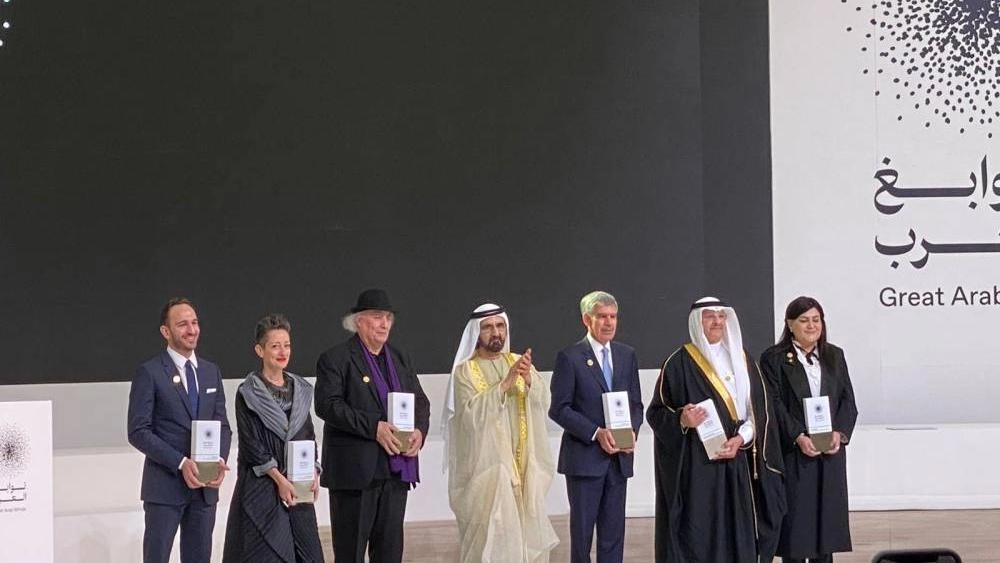
Dh100 million will be allocated to fostering regional innovation as a new research centre was launched at Dubai's Museum of the Future.
The project was announced by Mohammed Al Gergawi, Minister of Cabinet Affairs, during the Great Arab Minds (GAM) award ceremony held at the museum on Monday.
The event also saw Sheikh Mohammed bin Rashid, Vice President and Ruler of Dubai, honouring six Arab scientists and intellectuals who were among the first winners of the Great Arab Minds initiative.
The initiative was launched by Sheikh Mohammed in January last year, to identify the brightest minds in the Arab world and harness their ideas.
“We are often asked what we have contributed to human civilisation beyond crises and wars,” said Mr Al Gergawi, referring to Western perceptions of the Arab world.
“The answer is that our region is the cradle of civilisations and the birthplace of knowledge.
“Our history shows a long-standing tradition of valuing scholars, from the Muslim caliphs who weighed books with gold to the renowned libraries of Baghdad, Andalusia, and Cairo.”
During the ceremony Sheikh Mohammed honoured six Arab scientists and intellectuals.
US-based Saudi surgeon Dr Hani Najm, a Saudi heart surgeon renowned for his work in paediatric and congenital heart surgery at Cleveland Clinic, Ohio, was named as a winner of the award for his efforts in the medical sector.
“Its an incredible moment and an interjectory in our lives as Arabs,” Dr Hani told The National.
He said the award would certainly attract the brilliant Arab minds back to their native lands.
“Providing the appropriate environment for inventors to continue their work here would be the future of this platform.”
Lebanese Professor Lina Ghotmeh, recognised for her significant contributions to Architecture and Design globally, spoke about her approach.
“Architecture is our language to express our culture, history, and aspirations. I see this award as a recognition of the pivotal role of our discipline in shaping the Arab world's identity.”
Speaking to The National Dr Mohamed El Erian, an Egyptian-American economist and president of Queens' College, University of Cambridge who won the economics category award said the award would bring hope to those in need.
“Given the tragedy happening in Gaza and the need for hope for the Arab youth, this initiative is not only a reminder of how Arab thought has contributed to global advancements, It’s also a beacon of hope in these challenging times,” he said.
Addressing Arab youth, Mr El Erian said there will be many challenges ahead and the road will not be smooth.
“But persist, have a purpose and enable others in this journey because it's a very important journey not just for you but for our society,” he said.
The engineering and technology award was presented to Lebanese-born Professor Fadel Adib of Massachusetts Institute of Technology who has a track record of over 80 research papers and patents.
“This recognition is not just for my work but for the potential of Arab minds in engineering and technology. It's a testament to our capability to address complex global challenges.”
Algerian Professor Waciny Laredj, winner of the award in Literature and Arts, spoke of the broader implications of the award for the Arab intellectual community.
“This award raises an important question: Why do so many of our intellectuals and scientists seek opportunities abroad?”
“The true value of this initiative lies in its potential to create environments where Arab minds can thrive in their own countries.”
Lebanese Professor Niveen Khashab, honoured in Natural Sciences said her decision to join King Abdullah University of Science and Technology (KAUST) in 2008, was initially met with scepticism from peers.
“Many thought it was crazy to pursue a scientific career in an Arab country,” she said.
“This award brings hope, signalling a shift towards a brighter future for all Arab countries.
“Often, singers are more renowned than scientists here. But now, we're building a new generation that will recognise and value their scientists and inventors.”
They each received Dh1m to fund their research and privileges including offices for programme fellows at the museum.
Souce: Klyoum